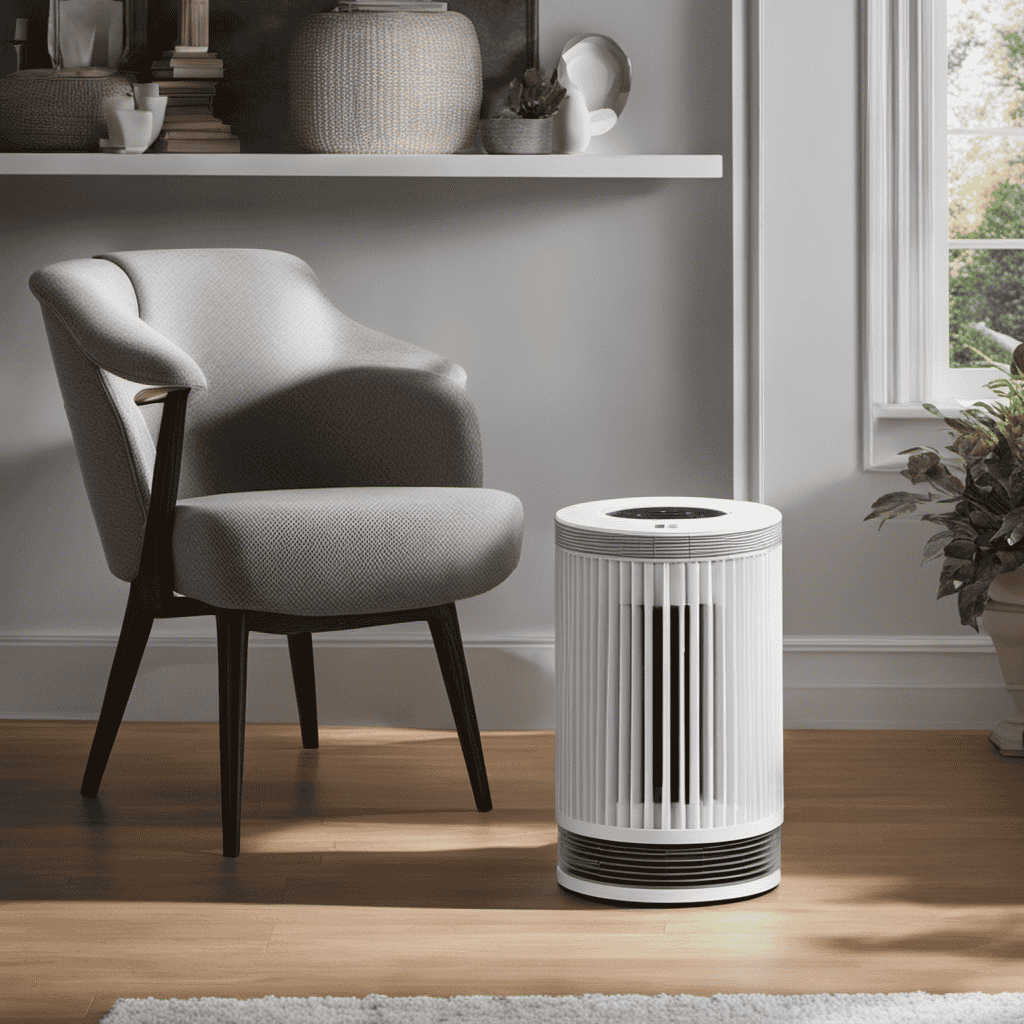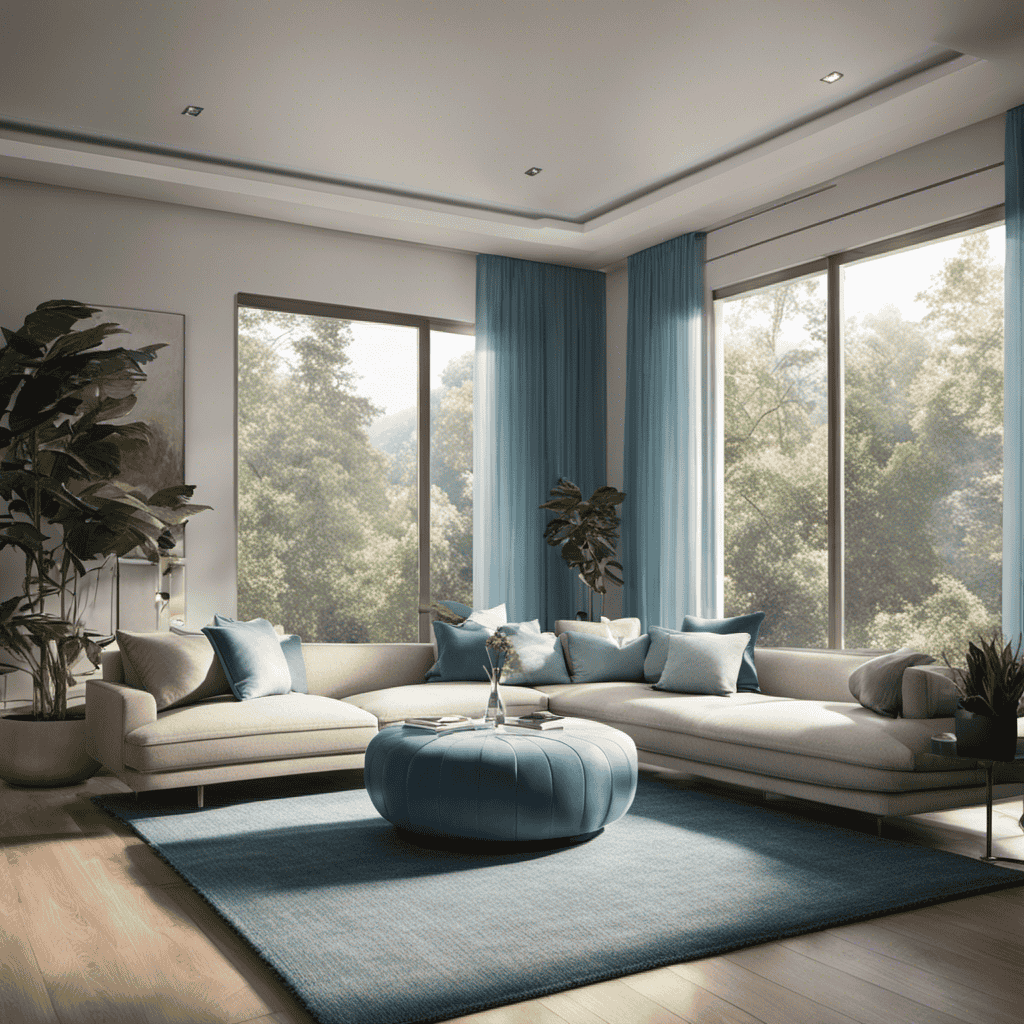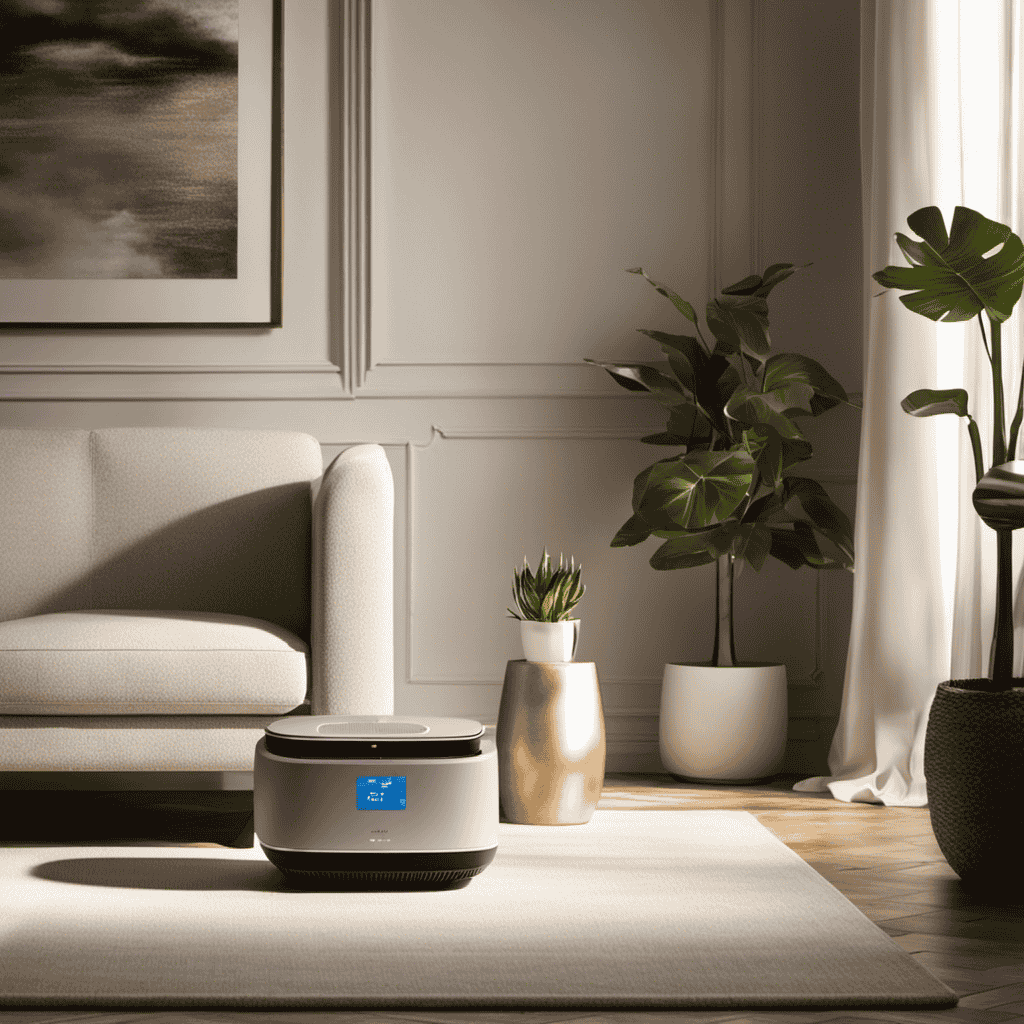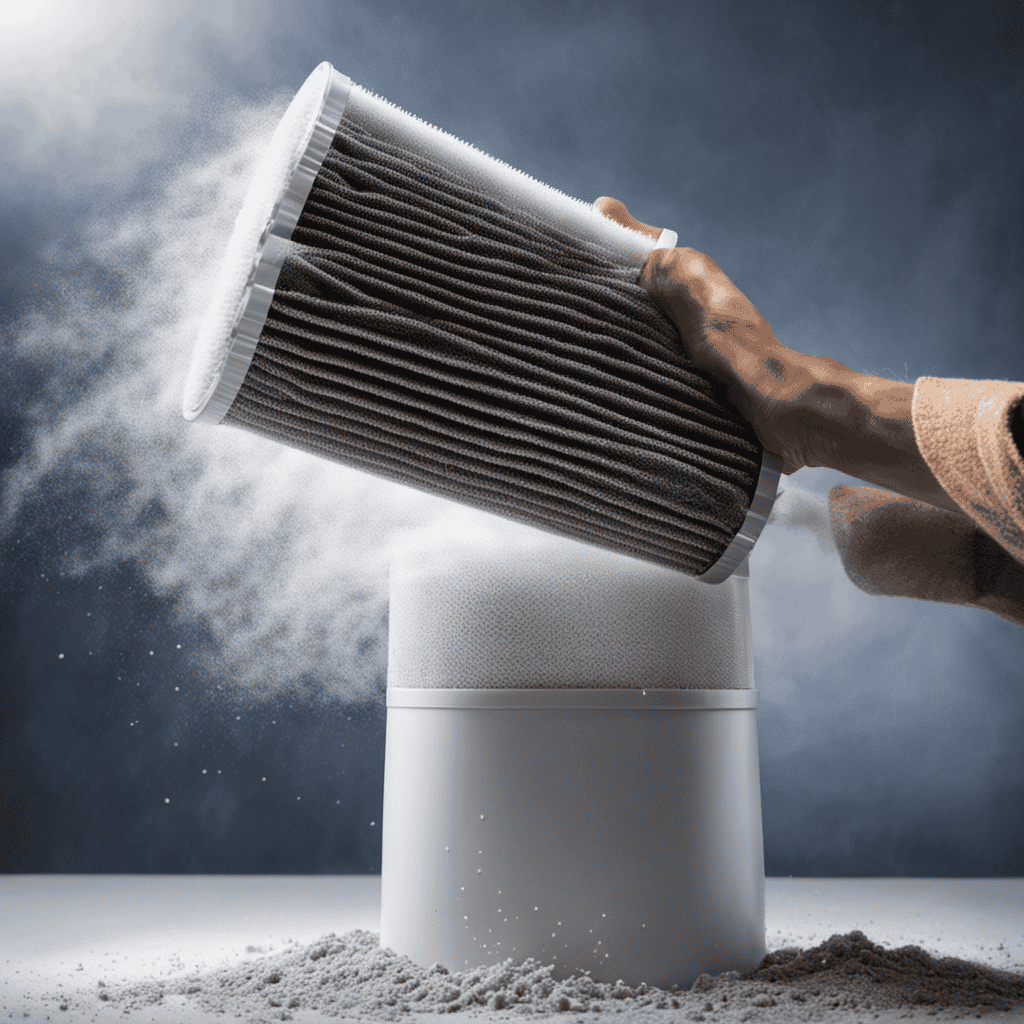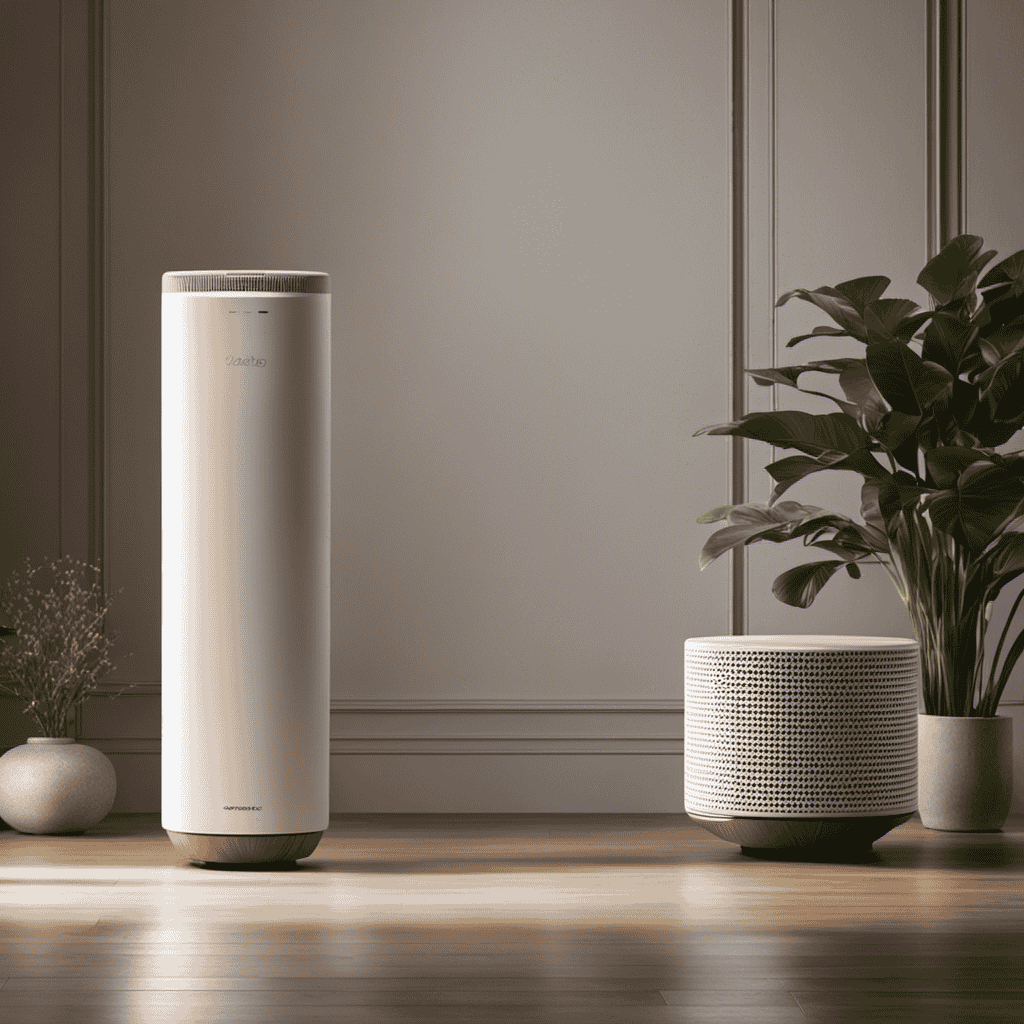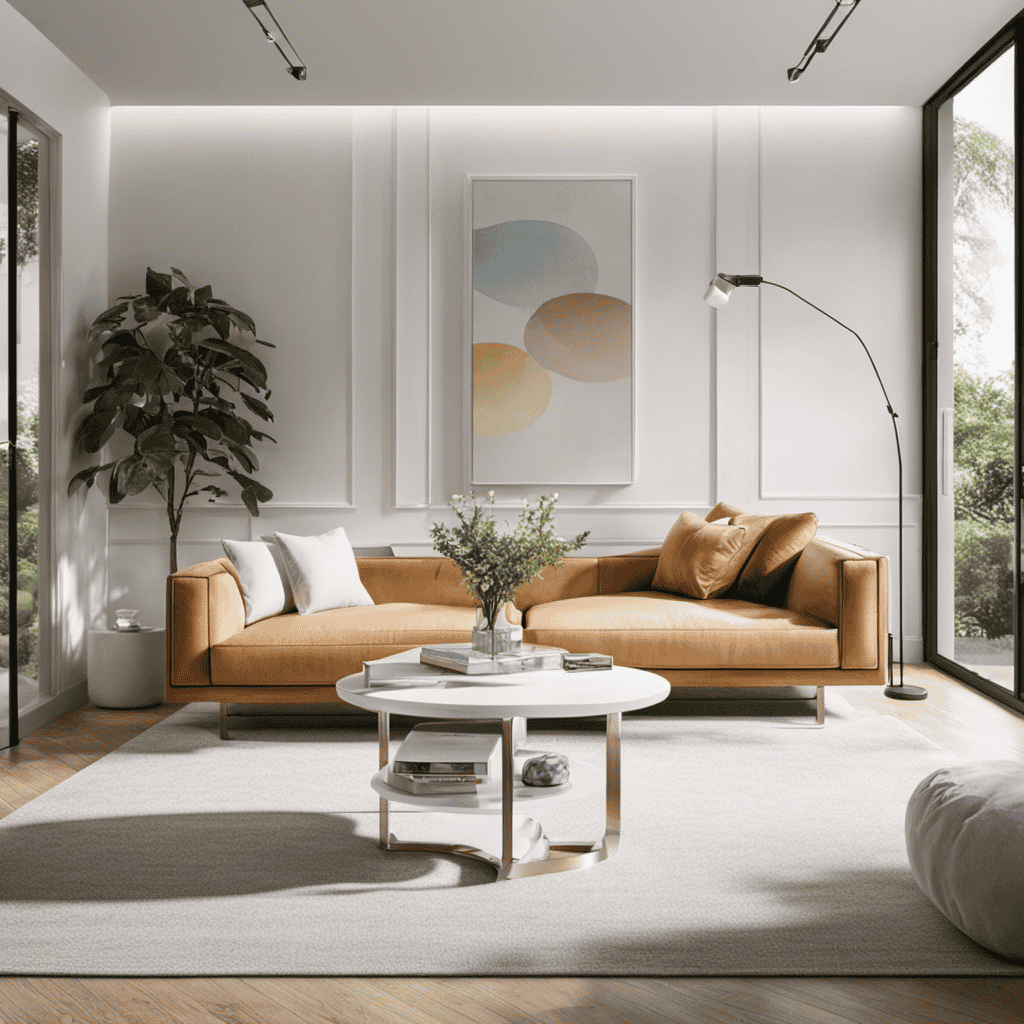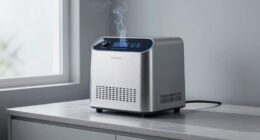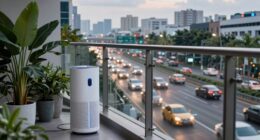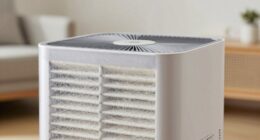If you own an air purifier, I’m sure you’ve thought about how frequently you should replace your filters. Don’t worry, I have the information you need.
In this article, we’ll delve into the factors that affect filter lifespan, the recommended frequency for filter changes, and the signs that indicate it’s time for a replacement.
We’ll also explore the importance of regular filter maintenance and how it impacts indoor air quality.
So, let’s dive in and discover the secrets to keeping your air purifier performing at its best!
Key Takeaways
- The recommended filter change frequency for air purifiers is typically every six months.
- Regular maintenance and cleaning of filters is crucial for optimal performance and extended lifespan.
- Signs that indicate the need for filter replacement include reduced airflow, increased dust or allergens in the home, and unpleasant odor from the air purifier.
- Different types of air purifier filters have varying lifespans, so it is important to follow the manufacturer’s recommendations for filter replacement.
Factors Affecting Filter Lifespan
When it comes to factors affecting the lifespan of your air purifier filters, there are a few key things you should keep in mind. Understanding these factors can help you optimize the performance of your filters and ensure they last as long as possible.
One of the most important factors affecting filter performance is the level of air pollution in your environment. The more pollutants present, the harder your filters have to work to clean the air. If you live in a highly polluted area or have pets or smokers in your home, you may need to change your filters more frequently.
Another factor to consider is the quality of your filters. Higher quality filters are generally more effective at capturing and removing pollutants, but they may also have a shorter lifespan. It’s important to find the right balance between filter quality and lifespan to ensure optimal performance.
Proper filter maintenance is also crucial for maximizing their lifespan. Regularly cleaning and vacuuming your filters can help remove accumulated dust and debris, allowing them to function more efficiently. Additionally, following the manufacturer’s recommended filter replacement schedule is essential.
Recommended Filter Change Frequency
The recommended frequency for changing air purifier filters is typically every six months. Regular filter maintenance is crucial to ensure optimal performance and clean indoor air quality.
Several factors can affect filter performance, including the level of air pollution in your area, the size of your home, and the presence of pets or smokers. By changing your filters regularly, you can prevent clogging and maintain the efficiency of your air purifier.
Regular filter maintenance offers several benefits. Firstly, it helps to remove airborne particles such as dust, pollen, and pet dander, improving the overall air quality in your home. This is especially important for those with allergies or respiratory conditions. Secondly, clean filters enhance the efficiency of your air purifier, allowing it to effectively capture and remove pollutants from the air. By providing a clean and healthy environment, regular filter changes can also help to reduce the risk of respiratory illnesses and improve overall well-being.
As time goes on, filters become less effective at capturing pollutants. Some signs that your filter needs changing include reduced airflow, a noticeable increase in dust or allergens in your home, or an unpleasant odor coming from the air purifier. By paying attention to these signs, you can ensure that your air purifier continues to provide clean and fresh air for you and your family.
Signs That Your Filter Needs Changing
If you notice reduced airflow or an unpleasant odor coming from your air purifier, it’s time to change the filter. Regular maintenance of your air filters is crucial to ensure that your air purifier continues to effectively clean the air in your home. Cleaning or replacing the filters on a regular basis will not only improve the performance of your air purifier but also extend its lifespan.
So, how often should you clean or replace your air filters? Well, it depends on a few factors such as the quality of your indoor air and the type of filter you are using. Generally, it is recommended to clean or replace your air filters every three to six months. However, if you have pets, smoke in your home, or suffer from allergies, you may need to clean or replace them more frequently.
Cleaning your air filters is relatively simple. Most filters can be rinsed with water, while others may require vacuuming or wiping with a damp cloth. However, not all filters are washable, so it’s essential to check the manufacturer’s instructions before attempting to clean them.
One popular type of air filter is the HEPA (High-Efficiency Particulate Air) filter. HEPA filters are known for their ability to capture 99.97% of airborne particles, including dust, pollen, pet dander, and even bacteria. Using a HEPA filter in your air purifier can greatly improve the air quality in your home, especially for those who suffer from allergies or asthma.
The Importance of Regular Filter Replacement
To ensure optimal performance, it’s crucial to regularly replace your air filters. Regular maintenance of your air filters not only ensures better air quality but also extends the lifespan of your air purifier. The importance of regular filter replacement cannot be overstated, as it directly affects the efficiency and effectiveness of your air purifier.
Here are the benefits of clean air and the importance of regular maintenance:
| Benefits of Clean Air | Importance of Regular Maintenance |
|---|---|
| 1. Improved Health | 1. Enhanced Airflow |
| 2. Allergen Reduction | 2. Dust and Dirt Removal |
| 3. Odor Elimination | 3. Prevention of Airborne Diseases |
| 4. Increased Energy | 4. Prolonged Air Purifier Lifespan |
| 5. Cleaner Living Space | 5. Cost Savings |
Clean air is essential for our overall health and well-being. By regularly replacing your air filters, you can reduce the presence of allergens such as dust, pollen, and pet dander, which can trigger allergies and respiratory issues. Additionally, clean air helps eliminate unpleasant odors and creates a healthier and more pleasant living environment.
Regular maintenance ensures that your air purifier functions optimally. It allows for enhanced airflow, which improves the efficiency of air filtration. By removing dust and dirt from the air, you can prevent the buildup of harmful particles in your home. This, in turn, reduces the risk of airborne diseases and promotes a healthier living space.
Moreover, regular filter replacement saves you money in the long run. By extending the lifespan of your air purifier, you avoid the need for costly repairs or premature replacement. Additionally, increased energy efficiency means lower electricity bills and a smaller environmental footprint.
Different Types of Air Purifier Filters
There are various types of filters used in air purifiers. When it comes to choosing the right filter for your air purifier, it’s important to consider factors such as filter replacement cost and eco-friendly options.
One commonly used filter is the HEPA (High-Efficiency Particulate Air) filter. These filters are highly effective at capturing particles as small as 0.3 microns, including dust, pollen, pet dander, and mold spores. HEPA filters are known for their high filtration efficiency and are often the go-to choice for those with allergies or asthma. However, they do need to be replaced regularly, which can add to the overall cost of using an air purifier.
Another type of filter that is gaining popularity is the activated carbon filter. These filters are great at removing odors and harmful gases from the air, such as smoke and volatile organic compounds (VOCs). Activated carbon filters are also often used in combination with HEPA filters to provide a comprehensive air cleaning solution.
For those looking for eco-friendly filter options, there are reusable filters available. These filters can be washed and reused, reducing the need for frequent replacements and minimizing waste. Additionally, some air purifiers now offer eco-friendly filter materials, such as bamboo charcoal, which is a sustainable and natural alternative to traditional filters.
How to Determine When to Change the Filter
A simple way to determine when it’s time to replace the filter is by checking the manufacturer’s recommended schedule. This schedule is usually based on the average usage and lifespan of the filter.
However, there are a few additional factors to consider when determining the effectiveness of the filter and the benefits of regular maintenance.
-
Air quality: If you notice a decline in air quality or an increase in allergens and dust particles in your home, it may be a sign that your filter needs replacement. Regularly changing the filter ensures that it can effectively capture and remove these pollutants from the air.
-
Filter condition: Inspect the filter regularly to check for any signs of wear and tear, such as visible dirt buildup or damage. A clogged or damaged filter will not be able to perform efficiently, reducing its effectiveness in improving indoor air quality.
-
Filter lifespan: Different filters have varying lifespans, ranging from a few months to a year or more. It is crucial to follow the manufacturer’s recommendations and replace the filter accordingly to maintain optimal performance.
Regular filter maintenance offers several benefits, such as improved indoor air quality, reduced allergies, and increased lifespan of your air purifier. By determining the filter’s effectiveness and following a regular maintenance schedule, you can ensure the longevity and efficiency of your air purifier.
DIY Filter Cleaning Vs. Replacement
Now that you know how to determine when to change the filter, let’s talk about the options you have when it comes to maintaining and cleaning your air purifier filter.
There are a few DIY filter cleaning techniques that you can try before deciding to replace it. One method is to vacuum the filter gently using a soft brush attachment. This can help remove dust and debris that has accumulated on the surface of the filter. Another technique is to rinse the filter under running water. Be sure to follow the manufacturer’s instructions and allow the filter to dry completely before reinserting it into the air purifier.
However, it’s important to note that DIY cleaning methods may not always be sufficient. Over time, filters can become clogged with pollutants and lose their effectiveness. This is where the benefits of filter replacement come into play.
Replacing the filter ensures that you are getting the best air quality possible. It allows the air purifier to function properly and efficiently, removing allergens, dust, and other contaminants from your indoor environment. Additionally, a fresh filter can help prolong the lifespan of your air purifier, preventing potential damage and costly repairs.
Extending the Lifespan of Your Filter
To extend the lifespan of your filter, make sure to follow the manufacturer’s recommendations for regular maintenance and cleaning. Proper care and maintenance of your air purifier filter is crucial in ensuring its optimal performance and longevity. Here are some tips and techniques to help you extend the lifespan of your filter:
-
Regular Cleaning: Cleaning your filter regularly is essential to remove accumulated dust and debris. Follow the manufacturer’s instructions on how to clean your specific filter type. This may involve rinsing, vacuuming, or using a brush to remove dirt and particles.
-
Air Purifier Placement: Properly positioning your air purifier can significantly impact the lifespan of your filter. Avoid placing it near sources of dust and pollutants, such as open windows or high-traffic areas. Additionally, keep it away from heat sources, as excessive heat can damage the filter.
-
Timely Filter Replacement: While regular cleaning can help prolong the lifespan of your filter, it is important to replace it when necessary. Most filters have a recommended replacement time frame, typically every 6 to 12 months. Be sure to check your manufacturer’s guidelines for the specific lifespan of your filter.
Understanding Filter Efficiency Ratings
Understanding filter efficiency ratings can help you make an informed decision when choosing the right filter for your air purifier. Filter efficiency testing is a process used to determine how well a filter can remove airborne particles from your indoor air. It involves measuring the filter’s ability to capture particles of different sizes, ranging from large dust particles to microscopic allergens.
One commonly used rating system for air filters is the Minimum Efficiency Reporting Value (MERV) rating. The MERV rating scale ranges from 1 to 20, with a higher number indicating a higher level of filtration efficiency. Filters with higher MERV ratings are capable of capturing smaller particles and are generally more effective at improving indoor air quality.
Understanding MERV ratings can help you choose a filter that meets your specific needs. For example, if you have allergies or asthma, you may want to consider a filter with a higher MERV rating to capture smaller allergens like pollen and pet dander. On the other hand, if you are primarily concerned about larger particles like dust and pet hair, a filter with a lower MERV rating may be sufficient.
The Role of Filter Maintenance in Indoor Air Quality
Regular filter maintenance is crucial for maintaining good indoor air quality. As an air purifier owner, I understand the importance of keeping my filters clean and functioning properly. Not only does it improve the overall efficiency of my air purifier, but it also has numerous benefits for my health and well-being. Here are three reasons why regular filter maintenance is worth the effort:
-
Improved air quality: Clean filters effectively trap and remove pollutants, allergens, and other harmful particles from the air, ensuring that the air I breathe is clean and healthy.
-
Cost-effective: By regularly cleaning and replacing my filters, I can prolong the lifespan of my air purifier and avoid costly repairs or replacements. The cost of filter maintenance is minimal compared to the potential expenses of neglecting it.
-
Health benefits: Breathing in clean air reduces the risk of respiratory issues, allergies, and other health problems. By maintaining my filters, I can create a healthier living environment for myself and my family.
Neglecting filter maintenance can have a significant impact on air purifier performance. When filters become clogged with dirt and debris, the airflow is restricted, reducing the effectiveness of the purifier.
In the next section, we will explore how neglecting filter maintenance can lead to decreased air purifier performance and compromised indoor air quality.
The Impact of Filter Neglect on Air Purifier Performance
Neglecting filter maintenance can lead to decreased performance of your air purifier and compromised indoor air quality. Regularly changing your air purifier filters is essential to ensure its optimal performance and to maintain healthy indoor air quality. Here are some filter maintenance tips and the benefits of regular filter changes.
| Filter Maintenance Tips | Benefits of Regular Filter Changes |
|---|---|
| Check the manufacturer’s recommendations for filter replacement frequency | Removes allergens and pollutants from the air |
| Inspect the filter regularly for dirt and debris | Reduces the risk of respiratory issues |
| Clean or replace the filter as needed | Extends the lifespan of your air purifier |
| Use high-quality filters for better performance | Improves the efficiency of the air purifier |
| Keep a schedule for filter changes | Enhances the overall air quality in your home |
Regularly cleaning or replacing your air purifier filters ensures that they can effectively trap and remove allergens, dust, pet dander, and other harmful particles from the air. This helps alleviate allergies, asthma symptoms, and other respiratory issues. Additionally, clean filters improve the airflow and overall performance of the air purifier, ensuring that it can efficiently circulate clean air throughout your home.
Tips for Properly Installing a New Filter
When it comes to installing a new filter in an air purifier, there are several key techniques to keep in mind.
First and foremost, it’s important to carefully read the manufacturer’s instructions to ensure proper installation.
Additionally, avoiding common installation mistakes such as improper alignment or failure to remove protective film can greatly enhance the filter’s performance and longevity.
Filter Installation Techniques
Installing air purifier filters properly can significantly improve the overall air quality in your home. Here are some techniques to ensure proper filter installation:
-
Turn off the air purifier: Before replacing the filter, make sure to turn off the air purifier and unplug it from the power source. This will prevent any accidents or damage during installation.
-
Follow the manufacturer’s instructions: Each air purifier may have different filter replacement methods. Read the manufacturer’s instructions carefully to understand the specific steps required for your model.
-
Handle the filter with care: Air filters are delicate and can easily be damaged. Avoid touching the filter material directly and be gentle when inserting it into the purifier. This will ensure that the filter functions effectively.
Common Installation Mistakes
Make sure to handle the filter with care to avoid damaging it during installation.
When it comes to air purifier filter installation, diagnosing installation issues and avoiding common mistakes is crucial.
One common mistake is not checking the size of the filter before purchasing. Filters come in different sizes, and using the wrong size can lead to poor air quality and reduced efficiency.
Another mistake is not properly aligning the filter with the arrows or markings on the unit. This can result in air bypassing the filter, rendering it ineffective.
Additionally, failing to replace the filter regularly can lead to clogging, decreased performance, and even damage to the air purifier itself.
Frequently Asked Questions
Can I Reuse an Air Purifier Filter After Cleaning It?
Yes, you can reuse an air purifier filter after cleaning it. Cleaning methods may vary depending on the type of filter, but generally, you can rinse or vacuum the filter to remove dust and debris. It’s important to follow the manufacturer’s instructions for cleaning and maintenance.
Regular cleaning can extend the lifespan of the filter and ensure optimal performance. However, keep in mind that filters will eventually wear out and need to be replaced.
How Do I Know if My Air Purifier Filter Is Still Effective?
How do we determine if our air purifier filters are still effective?
What are the signs that indicate a need for a filter change?
Air purifier filters typically last about 6 to 12 months, depending on usage and air quality.
However, there are telltale signs like reduced airflow, unusual odors, or visible dirt and debris on the filter.
Regularly inspecting and replacing filters ensures optimal performance and cleaner air in our homes.
Can I Use a Different Type of Filter in My Air Purifier?
When it comes to air purifiers, it’s important to use the right type of filter for optimal performance. Different types of filters are designed for specific purposes, such as removing allergens or odors.
Before using a different type of filter in your air purifier, it’s crucial to check the manufacturer’s guidelines for filter compatibility. Using an incompatible filter could affect the purifier’s efficiency and potentially damage the device.
Always prioritize using the recommended filter for your air purifier to ensure its effectiveness.
Is It Necessary to Change the Filter at the Recommended Frequency if I Don’t Use My Air Purifier Often?
To change or not to change, that is the question. Is it worth the hassle of replacing the filter regularly if I live in a clean environment?
Well, let me tell you, my friend. Even if your surroundings seem pristine, it’s still important to follow the recommended frequency of filter changes. Air purifiers are designed to catch even the tiniest particles, so maintaining a clean filter ensures optimal performance.
As for using a filter with a higher MERV rating, it’s best to consult the manufacturer’s guidelines to ensure compatibility.
Can I Extend the Lifespan of My Air Purifier Filter by Using It on a Lower Fan Speed?
Using a lower fan speed on your air purifier can potentially extend the lifespan of the filter. By reducing the speed, the air purifier is able to operate more efficiently and effectively. This means that the filter doesn’t have to work as hard to capture and remove particles from the air. As a result, the filter may last longer before needing to be replaced.
However, it’s still important to regularly check and change the filter according to the manufacturer’s recommendations.
What is the recommended frequency for changing air purifier filters?
The recommended air purifier filter replacement schedule varies depending on the specific purifier model and usage. However, most manufacturers suggest replacing the filters every 6 to 12 months for optimal performance. It’s important to follow the recommended schedule to ensure the air purifier functions effectively.
Conclusion
In conclusion, maintaining the lifespan of your air purifier filter is crucial for optimal indoor air quality. Remember, just like a tired soldier in battle, a neglected filter will lose its power to fight against the invisible enemies lingering in the air.
By regularly changing your filter, you are ensuring that your air purifier remains a mighty fortress, shielding you from the onslaught of pollutants. So, don’t underestimate the significance of this simple task.
Let your filter breathe new life into your surroundings, and let fresh air reign supreme.
